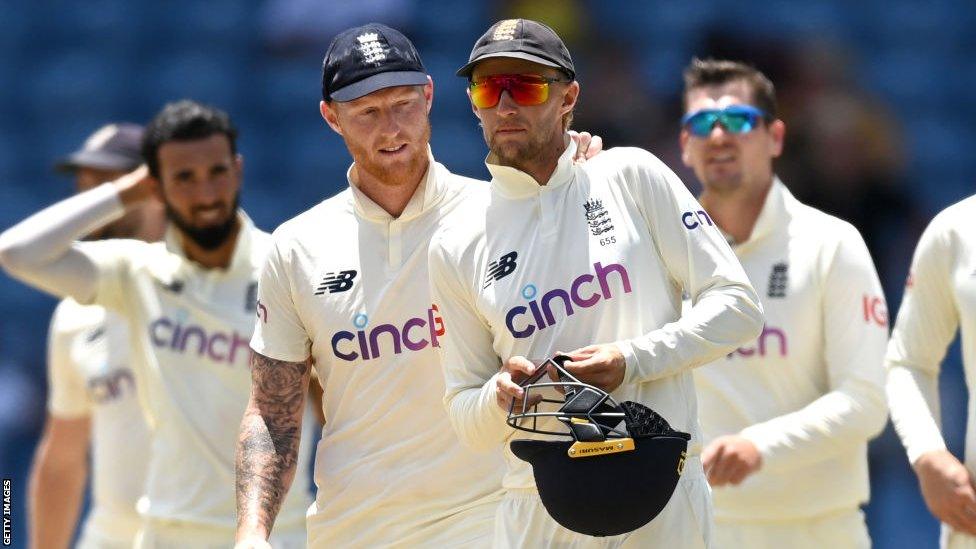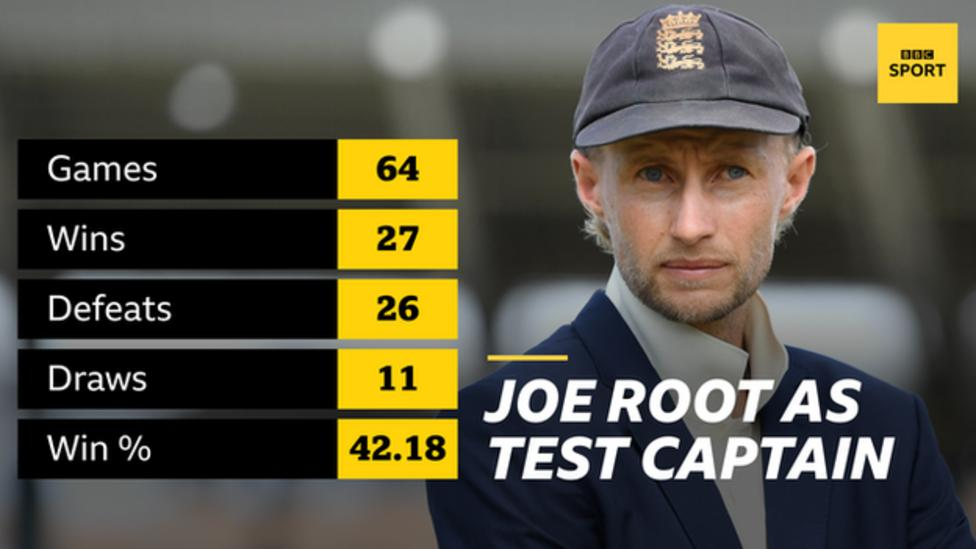Joe Root: 'The right decision to resign as captain - for himself and England'
- Published

England's third-Test defeat by West Indies in March means they have not won any of their past nine Tests
Joe Root made the right decision in stepping down as England Test captain.
It is the right thing for Root himself and the right thing for the team. There had to be a change at the top.
There was an argument for it happening after the Ashes defeat in Australia, but he was determined to carry on. They had this "red-ball reset", as they were calling it, in the West Indies and that clearly failed.
There were parts of the Caribbean tour that were positive, and it looked like a step in the right direction for England until the third-Test chaos in Grenada when they got blown away. From that moment I did not think Root could continue as skipper.
It is not that Root was to blame for that 1-0 series defeat, but the team had lost it. He looked exhausted, like he had the world on his shoulders.
Like football managers, captains have a shelf life. It gets to a stage where the players are not really listening to you any more, even if they think they are.

Being England Test captain is a 24-hour day occupation. You cannot just shut the door on it and watch the telly. It consumes you.
Root has done it for a long time. He has given it his best shot and deserves to go back to the ranks, get the chirpy side of his character back and keep scoring runs.
The remarkable thing is that he has scored so many runs while he has been captain - he has scored them while generally being a struggling captain who is having to chase the game.
Watch: Root's landmark century gives England commanding lead
Root has had it tough. During his time in charge England have been hammered twice in Australia. Plus he has had all the Covid complications to deal with - bio-secure bubbles as well as resting players - so it has not been an easy ride.
He can take a break now and let someone else try to rescue this floundering oil tanker that is drifting aimlessly down the English Channel in the wrong direction.
England are now without a captain, a coach and a managing director following the departures of Chris Silverwood and Ashley Giles in February.
In 1988 England used four captains in a series against West Indies. That was pretty chaotic, but it is even worse now because the people who make the appointments have not even been appointed themselves.
There is no-one in place to do anything. Until you have a managing director or coach, the captaincy cannot be filled. It just shows what a mess the England and Wales Cricket Board (ECB) is in.
That managing director will have two massive decisions to make that will decide the immediate future of English cricket: who will be the next captain and coach?
Do they want a long-term captain, someone they can see being in position for another four years? Or do they just think 'let's get through this summer and try and steady the ship'?
These decisions may take some time, but I would suggest that is the answer for now - get someone in as captain for four Tests as a focus, against New Zealand and India, and take it from there.
Quite simply, there are so few candidates that it rules out any kind of long-term appointment.
Someone like Ben Stokes could be one if he is fit enough, but I do not know if it is good for Stokes or for English cricket if he was saddled with the captaincy.
You look back at the big characters that have captained England like Ian Botham, Kevin Pietersen and Andrew Flintoff - they have all failed as captains. We all want Stokes to go out there and express himself.
But the only answer for now is to hope that Stokes is fit enough to get through those four Tests this summer, manage his knee, perhaps bowl a little less, and let things settle down a bit.
As for the new coach, the managing director will make that appointment - and that is a huge decision for an individual who probably will not have much experience in doing something like this before.
Will England go for a foreign coach? Will they have separate coaches for Test and limited-overs cricket?
What we do know is that the managing director will have a blank sheet of paper and some big pieces of the jigsaw to fill in. They must get them right.
Jonathan Agnew was speaking to BBC Sport's Ffion Wynne.
